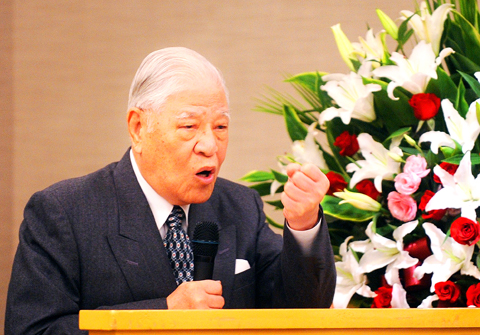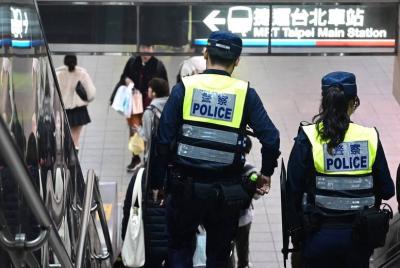Former president Lee Teng-hui (李登輝) yesterday introduced a new political association to the public, with the stated aim of deepening democracy in the country, which he said had fallen victim to ideology and partisan warfare.
Lee said the Lee Teng-hui Democracy Association (李登輝民主協會) was established to point out the flaws of the government and speak out for the people.
Bemoaning the fact that no progress has been made since 2000, Lee said the nation desperately needed a new wave of reform to deepen its democracy. Such reform initiatives should cover the areas of democracy, politics, education, the judiciary and spirit, he said.

PHOTO: LO PEI-DER, TAIPEI TIMES
During his 12-year presidency, Lee said his policy was to transform the country from an authoritarian state to a democracy and he was glad that goal was achieved with the help of the people.
Although Taiwan saw two transfers of power in 2000 and 2008, Lee said moral decline and cultural retrogression since then has become a major problem.
Lee said many people believe the two changes of government have made Taiwan’s democracy healthier and more mature, but in reality the two political camps have been engaged in virulent partisan competition at the expense of national interest and public well-being.
“People must vote the government out of power if it does a bad job,” he said. “People are the real masters of the country and it makes perfect sense for a master to change his servant if he cannot do his job properly.”
Lee urged the government to reach out to the opposition and seek consensus on national identity. As it will take a long time to resolve the complex issue of Taiwan’s statehood, he also urged politicians to handle political matters rationally and be tolerant of different ideologies and political positions.
Criticizing the government’s economic policy, Lee said it not only failed to address the unemployment problem, but also adopted a hands-off approach in managing China-bound investment and appeared not to care about the hardships the public is facing.
Lee also questioned China’s sincerity following its recent promises to help Taiwan sign free-trade agreements with other countries if Taipei signs an economic cooperation framework agreement (ECFA).
“It never means what it says and will lie if that serves its purposes,” he said.
Tadae Takubo, vice chairman of Friends of the Lee Teng-hui Association in Japan, expressed concern over the government’s China-friendly policy, saying Tokyo could not afford to ignore such a disturbing development.
“Taiwan’s attitude toward Japan, the US and China plays a significant role in the shifting military balance in the Asia-Pacific region,” he said.

Beijing could eventually see a full amphibious invasion of Taiwan as the only "prudent" way to bring about unification, the US Department of Defense said in a newly released annual report to Congress. The Pentagon's "Annual Report to Congress: Military and Security Developments Involving the People's Republic of China 2025," was in many ways similar to last year’s report but reorganized the analysis of the options China has to take over Taiwan. Generally, according to the report, Chinese leaders view the People's Liberation Army's (PLA) capabilities for a Taiwan campaign as improving, but they remain uncertain about its readiness to successfully seize

Taiwan is getting a day off on Christmas for the first time in 25 years. The change comes after opposition parties passed a law earlier this year to add or restore five public holidays, including Constitution Day, which falls on today, Dec. 25. The day marks the 1947 adoption of the constitution of the Republic of China, as the government in Taipei is formally known. Back then the Chinese Nationalist Party (KMT) governed China from Nanjing. When the KMT, now an opposition party in Taiwan, passed the legislation on holidays, it said that they would help “commemorate the history of national development.” That

Taiwan has overtaken South Korea this year in per capita income for the first time in 23 years, IMF data showed. Per capita income is a nation’s GDP divided by the total population, used to compare average wealth levels across countries. Taiwan also beat Japan this year on per capita income, after surpassing it for the first time last year, US magazine Newsweek reported yesterday. Across Asia, Taiwan ranked fourth for per capita income at US$37,827 this year due to sustained economic growth, the report said. In the top three spots were Singapore, Macau and Hong Kong, it said. South

Police today said they are stepping up patrols throughout the Taipei MRT system, after a social media user threatened to detonate a bomb at an unspecified station this afternoon. Although they strongly believe the threat to be unsubstantiated, Taipei Metro police and the Railway Police Bureau still said that security and patrols would be heightened through the system. Many copycat messages have been posted since Friday’s stabbing attacks at Taipei Main Station and near Zhongshan MRT Station that left three dead and 11 injured, police said. Last night, a Threads user in a post said they would detonate a bomb on the Taipei